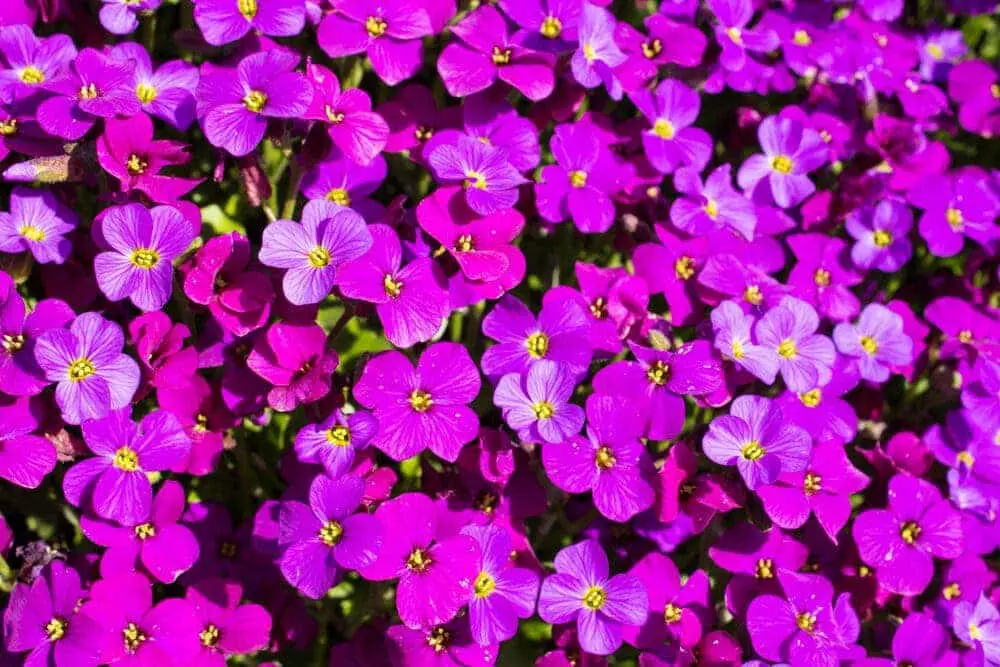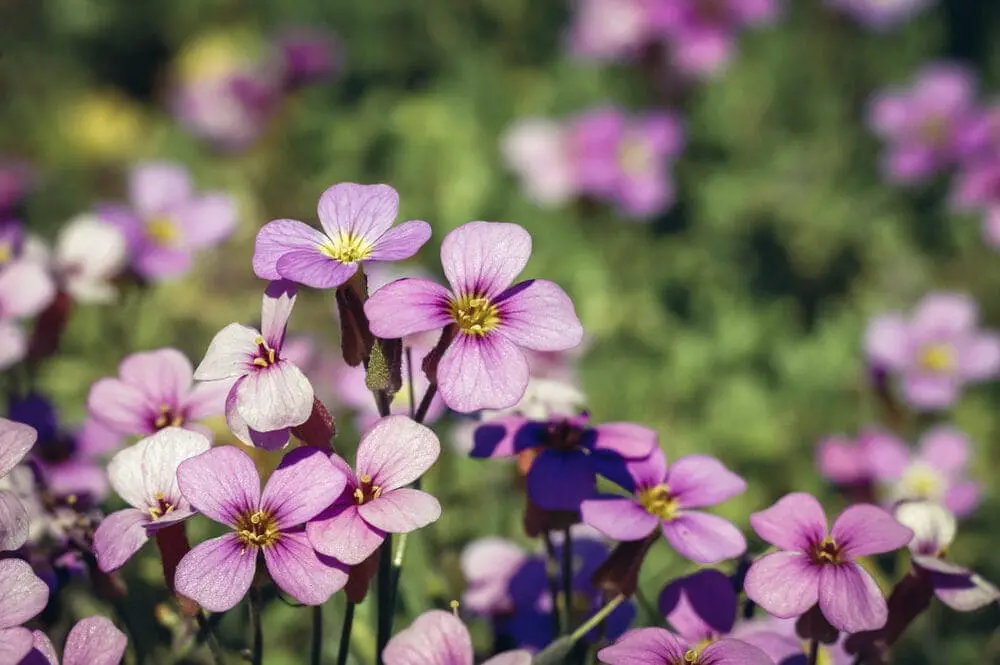The Rock Cress is an amazingly beautiful plant that is small enough to where anyone should be able to grow it.
If you want to make an addition to your rock garden, this is definitely one option to consider. This article will help you grow and nurture this plant properly.
Rock Cress Flowers Care & Growing Guide
1. Light Requirement
It is best to keep the Rock Cress plant in direct sunlight so it will grow properly. These plants can do well in partial shade, but it is not ideal. If you are going to grow this type of plant outside, you’ll need to pick an area that gets bright sunlight.
2. Water
It is crucial that you not overwater this plant, as it is very sensitive to excess moisture. Too much moisture can quickly kill the plant. You should only water these plants often at first so they grow properly.
Once the play is established, you will only have to water it once the soil is very dry. All you have to do is simply feel the soil to determine whether or not watering is needed. It’s important that you limit watering to the hotter months of the year to avoid excess moisture buildup.
3. Climate
This plant can be grown in USA hardiness zones 4 through 7. There is no question that these plants tend to do best when they are grown in a hot climate.
4. Soil
You can grow your rock cress in fair soil, provided it offers adequate drainage. You’ll also need to make sure that the soil has a little acidic but not too much. You will be able to use clay soil, loam or sandy soil to grow these plants.
It’s also a good idea to use a high-nitrogen fertilizer when growing this plant. This will provide you with the best chances of growing this plant strong from the beginning.

5. Temperature
If you want your rock cress plant to really thrive, you will need to keep the soil temperature between 55 and 65 degrees Fahrenheit. This will encourage germination, which takes anywhere from 8 to 15 days.
You should begin growing your rock cress plant anywhere from 4-6 weeks prior to the next time you are expecting to get frost. This will hopefully allow you to grow the plant outside in ideal weather. You don’t want to try growing one of these plants outdoors when it is too cold, as they most likely will not survive.
6. Speed of Growth
It takes four to six weeks for this plant to reach its maximum height, which can be in excess of six inches. Since this plant grows fairly quickly, you will need to make a point of keeping up with it.
7. Height and Spread
These plants can grow up to 12 inches with a spread of 1 to 4 feet. This means that you will need to carefully consider where you put it. Make sure that you keep a minimum distance of six feet between this plant and others in your garden.
8. Flowers
The white and pink flowers that this plant produces are absolutely beautiful. This is one of the reasons why so many people put these plants in their gardens. While these flowers are fairly small, they have a very pleasant aroma.
When this plant blooms in the spring or summer, its flowers are usually pink or red. These flowers can also have a lavender coloration, which is particularly stunning. Certain types of these plants even produce white flowers.
These plants bloom the second spring after you initially plant them. Once they are established, they will start flowering every single year. This means that you will have some very beautiful plants to look forward to annually, which is always nice.
9. Trimming
You should be prepared to trim this plant regularly to remove dead flowers as needed. This will help with keeping your plant in good condition overall.

How to get Rock Cress Plants to Flower
If you want to get your rock cress plant to flower, it is important that you grow it outside in full sunlight. Keeping these plants in even partial shade can make it harder for them to bloom properly. These plants begin flowering in spring.
Similar post: Hyacinth Flowers Care & Growing Guide
Common Rock Cress Plant Diseases
Root rot is among the most common problems that rock cress plants have, and it is due to overwatering. These drought-tolerant plants don’t need a lot of water on a regular basis once they are established. Once the plant’s roots begin to rot, it can be very difficult to reverse the damage.
Another great thing about these plants is that you don’t typically need to treat them for disease. As long as you make a point of doing everything right with maintaining your plant, you shouldn’t have to worry about this.
You should only use a fungicide or insecticide agent on these plants if you absolutely have to. These plants can be very sensitive to abrasive chemicals, so you need to keep that in mind. Pests are generally not a big issue with rock cress plants, but anything is possible.
Also read:
Conclusion
- While rock cress plants can survive in partial shade, they definitely prefer full sunlight.
- It is important to water this plant regularly at first, but you can wait to water it until the soil is dry once it’s established.
- These plants are very sensitive to excess moisture, so you’ll want to keep that in mind.
- This plant can be grown in USDA hardiness zones 4 through 7. It prefers hot climates with lots of sunlight.
- The best soil temperature range from this plant is between 55 and 65 degrees Fahrenheit.
- You can grow this plant in poor to fair soil, but it must drain well.
- The pink and sometimes red flowers that this plant produces in the spring and summer months are very beautiful.
- Regular trimming is not really needed, though you’ll want to remove dead leaves when necessary.
- These plants are not prone to disease, but root rot can be a problem with over watering.

Victoria is the owner and main author of hobby plants. She loves spending her free time in her garden planting and taking care of her plants. Victoria hopes you enjoy the content here!
![Queen Of The Night Flower [Complete Plant Care Guide] Queen Of The Night Flower [Complete Plant Care Guide]](https://www.hobbyplants.com/wp-content/uploads/2022/07/queen-of-the-night-flower-300x158.jpg)
![Mother Of Thousands Plant [Complete Plant Care Guide] Mother Of Thousands Plant [Complete Plant Care Guide]](https://www.hobbyplants.com/wp-content/uploads/2022/07/mother-of-thousands-plant-300x158.jpg)
![How Often Should You Water Pothos? [Complete Care Guide] How Often Should You Water Pothos? [Complete Care Guide]](https://www.hobbyplants.com/wp-content/uploads/2022/07/how-often-to-water-pothos-300x158.jpg)
![Can Snake Plants Live Outside? [COMPLETE CARE GUIDE] Can Snake Plants Live Outside? [COMPLETE CARE GUIDE]](https://www.hobbyplants.com/wp-content/uploads/2022/08/can-snake-plants-live-outside-300x158.jpg)
![Majesty Palm Plant Care: [Complete Beginner's Guide] Majesty Palm Plant Care: [Complete Beginner's Guide]](https://www.hobbyplants.com/wp-content/uploads/2022/08/majesty-palm-care-300x158.jpg)
![Exotic Angel Plant Care: [Complete Beginner's Guide] Exotic Angel Plant Care: [Complete Beginner's Guide]](https://www.hobbyplants.com/wp-content/uploads/2022/08/exotic-angel-plant-care-300x158.jpg)
![Do Coleus Like Sun Or Shade: [Complete Care Guide] Do Coleus Like Sun Or Shade: [Complete Care Guide]](https://www.hobbyplants.com/wp-content/uploads/2022/08/coleus-sun-or-shade-300x158.jpg)
![Snow White Waffle Plant: [Complete Care Guide] Snow White Waffle Plant: [Complete Care Guide]](https://www.hobbyplants.com/wp-content/uploads/2022/08/snow-white-waffle-plant-300x158.jpg)
![Waffle Plant Care: [Complete Beginner's Guide] Waffle Plant Care: [Complete Beginner's Guide]](https://www.hobbyplants.com/wp-content/uploads/2022/08/waffle-plant-300x158.jpg)
![Bird Of Paradise Plant Care: [Complete Beginner's Guide] Bird Of Paradise Plant Care: [Complete Beginner's Guide]](https://www.hobbyplants.com/wp-content/uploads/2022/08/bird-of-paradise-plant-300x158.jpg)
![Purple Passion Plant Care: [Complete Beginner's Guide] Purple Passion Plant Care: [Complete Beginner's Guide]](https://www.hobbyplants.com/wp-content/uploads/2022/08/purple-passion-plant-care-300x158.jpg)
![China Doll Plant Care: [Complete Beginner's Guide] China Doll Plant Care: [Complete Beginner's Guide]](https://www.hobbyplants.com/wp-content/uploads/2022/09/china-doll-plant-care-300x158.jpg)